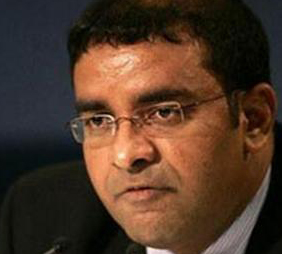President Bharrat Jagdeo yesterday announced a 5% salary hike for public servants, a temporary $4,000 non-taxable payment per month for those earning under $50,000 monthly and an initiative to keep bread prices from rising.
He announced the multi-tiered assistance package to cushion the cost of living during a press conference at the Office of the President yesterday. According to the President, the relief decisions have been based on consultations and feedback from various stakeholders.
As a means of cushioning the effects of the recent increase in the price of flour, the Government will subsidise for the next four months the additional cost for flour to 22 pre-approved bakeries, which he said produce 95 per cent of Guyana’s bakery products. In this way, the cost for bakers’ products should not increase, he stated.
Two days ago, the National Milling Company (NAMILCO) instituted a 25 per cent increase in its main product, Thunderbolt Flour, citing high acquisition costs for wheat. The company had at the beginning of March also increased its prices by 16 per cent, as a response to Government’s removal of the Value Added Tax (VAT) on the product.
Jagdeo said that approval has been granted for the immediate payment of a 5 per cent across-the-board increase in wages and salaries for public servants with effect from January 1, 2008. “This increase follows a similar 5 per cent increase that has already been paid with effect from [January 1, 2008] to teachers and members of the disciplined services, and a 9 per cent increase that was paid to all of these categories of Government employees with effect from [January 1, 2007…]” Jagdeo said.
The President also announced that Government employees earning less than $50,000 will temporarily benefit from an additional tax-free top-up of $4000 each month. This will last until the end of this year when it will be reviewed, the President said.
Also the Government will be selling subsidised one-kilogramme sacks of flour at the old flour mill price to specified groups of vulnerable people. This is to be facilitated through the New Guyana Marketing Corporation (New GMC). The flour initiatives will cost the government $200M.
The President also said that an amount of $20M will be spent on seeds and other items to enable persons to get involved in the cultivation of various crops – both on a large and small scale. This entails the distribution of chemicals, fertilizers and 600,000 packages of vegetable seeds across the 10 regions.
Calling the moves temporary transitional measures to cushion the impacts of cost of living, the President said that he had engaged bakeries on the issue of the relief to be offered and he has received their assurance that their prices will not increase. The Government will essentially absorb the difference between the old and new price for flour.
Jagdeo expressed the hope that the price of wheat comes down based on projections of a bumper crop in the wheat-growing countries. NAMILCO had said that Guyana may not benefit from the lower prices until around September since the mill is already locked into purchase for the next two shipments of wheat.
“I hope we will not see any price increases for bread, biscuits and pastries. He said too that a limited amount of flour – 200,000 one kilogramme sacks – will be marketed by the New GMC at the old price.
“We will continue to monitor the situation and make interventions,” he said, adding that further action will depend on the outcome of a consultative process to assess the situation.
The President stressed that the measures announced yesterday and at various times during last year and this year are designed to ensure that relief is brought to the consuming public while at the same time ensuring that the country’s economic gains are not frittered away through the short term relief measures. He said that there has to be a careful balance lest the country’s macro-economic fundamentals are changed for the worse.
At various fora, most recently the May Day march and subsequent rallies, there had been several calls for the Government to tackle the rising cost of living and to bring some measure of relief in the form of the reduction of the VAT or the distribution of food vouchers.
The President prefaced his remarks by pointing to recent interventions to mitigate rising prices which included the increase of the income tax threshold from $28,000 to $35,000 monthly from January 1, 2008, a 63% in old-age pensions, a progressive reduction of the fuel excise tax on gasoline and diesel from 50% and 25% respectively to 17% and 0% respectively.
He also referred to the VAT zero-rating of a list of additional items from March 1, 2008. Critics have called for a slashing of the VAT rate from 16% to ease the cost of living burden particularly in light of the windfall that was collected by the state last year.
Jagdeo also cited the containment of electricity and water tariffs.
Parliament is expected to debate today a government motion on its cost of living initiatives.
The PNCR has also planned a march for today to press the government to take further steps on the cost of living.





